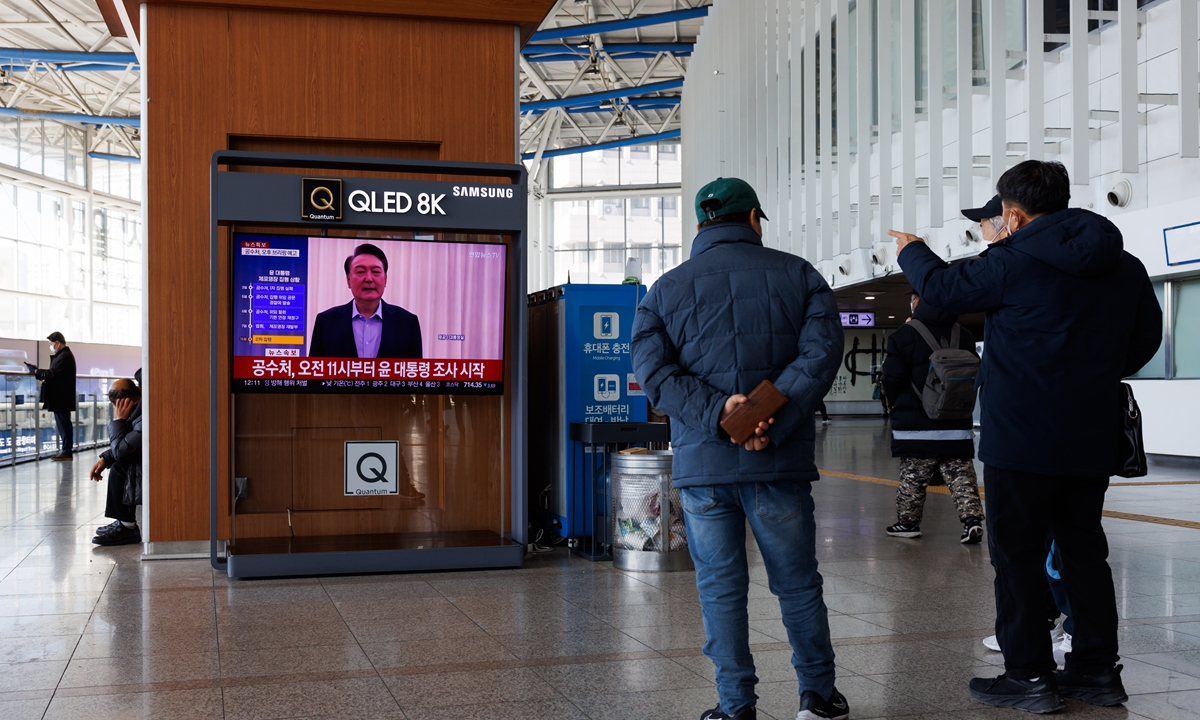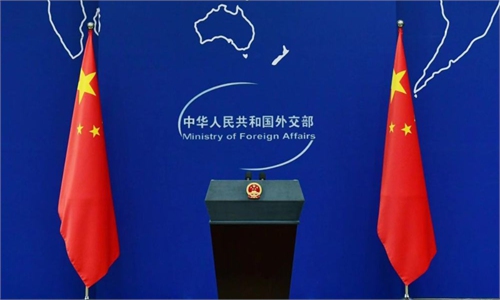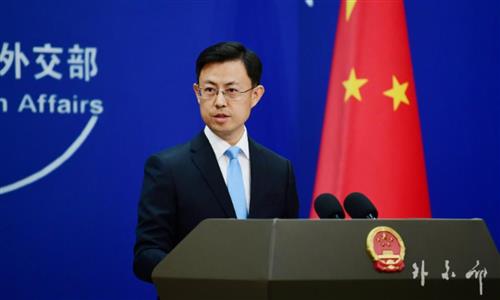Yoon becomes first sitting president of S.Korea arrested
New round of political rivalry may lead to greater uncertainties: expert

A screen displays a news report on the arrest of South Korean President Yoon Suk-yeol at Seoul Station in Seoul, South Korea, on January 15, 2025. Photo: VCG
When asked to comment on the arrest of South Korean President Yoon Suk-yeol, Guo Jiakun, Chinese FM spokesperson, said "We don't comment on the ROK's (Republic of Korea) domestic affairs. China and the ROK are important neighbors and cooperation partners. China stands ready to work with the ROK for the sound and steady growth of bilateral relations."Yoon was arrested at the presidential residence on Wednesday, becoming the country's first sitting president to be kept in custody over his short-lived martial law imposition, media reported.
A joint investigation unit, composed of the Corruption Investigation Office for High-ranking Officials (CIO), the National Office of Investigation (NOI) and the defense ministry's investigative headquarters, said in a short notice that Yoon was arrested at 10:33 am local time on Wednesday, according to the Xinhua News Agency.
According to Yonhap News, Yoon said Wednesday he decided to appear for investigation in order to prevent "bloodshed" between law enforcement and his security team, even though he believes it is an "illegal" investigation.
Yoon issued the statement before heading to the headquarters of the CIO, as the CIO and the police executed a warrant to detain the besieged president over his short-lived imposition of martial law.
"To prevent an unfortunate and violent incident, I decided to appear before the CIO even though I believe the investigation is illegal," Yoon said in a video message recorded at his residence.
Just before dawn on Wednesday, a team of investigators arrived at Yoon's residence, armed with ladders to climb over buses blocking its entrance and bolt croppers to cut through the barbed wire, BBC reported.
Other officers in the arrest team, which numbered around 1,000, scaled walls and hiked up nearby trails to reach the presidential residence. After several hours, authorities announced that Yoon had been arrested.
On Tuesday, a military unit guarding the presidential residence approved the entry of police and CIO officials into the presidential residence, according to Yonhap.
The second attempt to arrest the president, led by the Corruption Investigation Office (CIO) for High-ranking Officials, faced virtually no resistance from the Presidential Security Service, according to the CIO officials leading the probe, said the Korea Herald.
Wednesday's raid marked several changes from their first attempt that took place on January 3, in which some 150 investigators and police had to turn back after an over five hour-long standoff with approximately 200 presidential bodyguards and military personnel forming a human barricade to block their entry, said the Korea Herald.
The CIO and police had made sufficient preparations for the second arrest operation, however, Yoon will probably deny all the accusations against him, thus the future judicial investigation into him will face significant difficulties, Xiang Haoyu, a research fellow at the China Institute of International Studies, told the Global Times on Wednesday.
Yoon also claimed on Wednesday "Martial law is not a crime. Martial law is an exercise of presidential authority to overcome a national crisis," Yoon wrote, posting a photo of his handwritten letter, Korean Times reported.
Uncertainties ahead
The CIO said it began questioning Yoon at its office in Seoul at 11 am Wednesday, but that he has refused to testify.
The anti-corruption body has 48 hours to decide whether to request a court to issue an arrest warrant for Yoon, according to Yonhap.
The interrogation, with over 200 pages of questions prepared, is expected to focus on substantiating key allegations surrounding the failed martial law imposition, ranging from the planning stages leading up to the event to its execution on the day, Yonhap reported.
In a parallel probe, the Constitutional Court on Tuesday launched a trial to rule on parliament's impeachment of Yoon. If the court endorses the impeachment, Yoon will finally lose the presidency and fresh elections will have to be held within 60 days, according to AFP.
Yoon's impeachment trial is currently pending ruling by the Constitutional Court. However, many uncertainties remain due to factors such as the court's trial procedures, the judges' political stances, and the intense political struggle among domestic factions, Dong Xiangrong, a senior research fellow at the National Institute of International Strategy, Chinese Academy of Social Sciences, told the Global Times.
A decision of the Constitutional Court requires more than six votes for the impeachment, Dong explained, noting that considering various factors such as the stances of political parties and personal positions of the judges, there is both a possibility that this case could either be rejected or recognized by the Constitutional Court.
Xiang said Yoon's arrest may also further intensify conflicts between different political forces in South Korea, leading this round of political turmoil to new developments, potentially triggering greater instability in the political landscape in South Korea.
Following Yoon's detention, the ruling People Power Party (PPP) vowed to hold the CIO accountable for what it called the "illegal" execution of the detention warrant, echoing Yoon's assertions of its illegality, according to the Korea Times.
However, the main opposition Democratic Party of Korea (DPK) said the detention is a significant step toward upholding the rule of law. The DPK is now pressing the ruling party to pass a special counsel bill to investigate the treason charges against Yoon, the Korea Times reported.
South Korea's ruling People Power Party may seek to defend its ruling status by protecting the president, trying to delay judicial investigations into Yoon as long as possible, and postponing the timeline for his stepping down to avoid holding a new presidential election in South Korea too soon, said Xiang.
In the future, the opposition parties are also likely to engage in disputes with the ruling party over topics such as the impeachment trial of Yoon and the scandal involving first lady. These disputes may also provoke division among the public, said Xiang.



